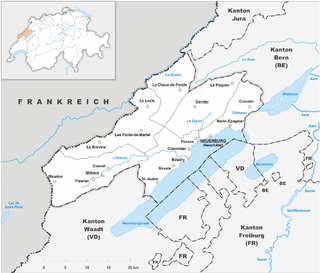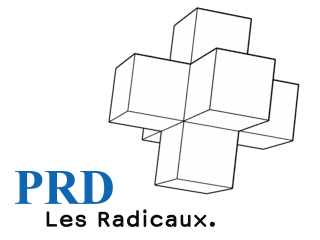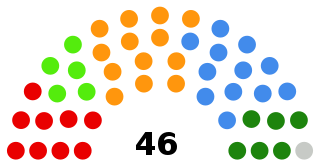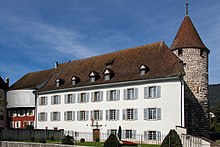The politics of Luxembourg takes place in a framework of a parliamentary representative democratic monarchy, whereby the Prime Minister of Luxembourg is the head of government, and the multi-party system. Executive power is under the constitution of 1868, as amended, exercised by the government, by the Grand Duke and the Council of Government (cabinet), which consists of a prime minister and several other ministers. Usually, the prime minister is the leader of the political party or coalition of parties having the most seats in parliament. Legislative power is vested in both the government and parliament. The judiciary is independent of the executive and the legislature.

The 26 cantons of Switzerland are the member states of the Swiss Confederation. The nucleus of the Swiss Confederacy in the form of the first three confederate allies used to be referred to as the Waldstätte. Two important periods in the development of the Old Swiss Confederacy are summarized by the terms Acht Orte and Dreizehn Orte.

The Social Democratic Party of Switzerland or Swiss Socialist Party, is a political party in Switzerland. The SP has had two representatives on the Federal Council since 1960 and received the second highest total number of votes in the 2019 Swiss federal election.

The Republic and Canton of Neuchâtel is a French-speaking canton in western Switzerland. In 2007, its population was 169,782, of whom 39,654 were foreigners. The capital is Neuchâtel.

The Free Democratic Party or Radical Democratic Party was a liberal political party in Switzerland. Formerly one of the major parties in Switzerland, on 1 January 2009 it merged with the Liberal Party of Switzerland to form FDP.The Liberals.
The Christian Social Party (CSP) is a political party in Switzerland of the Christian left. The CSP is more aligned with social democracy than the other major Christian party, the Christian Democratic People's Party of Switzerland (CVP), which is more economically liberal. With the moderate Christian left as its background, the CSP commits itself to social-democratic and environmentalist political solutions. The core principles of the CSP contain, among others, "solidarity with the socially and economically disadvantaged and the preservation of the environment."

The Federal Assembly, also known as the Swiss parliament, is Switzerland's federal legislature. It meets in Bern in the Federal Palace.
Voting in Switzerland is the process by which Swiss citizens make decisions about governance and elect officials. The history of voting rights in Switzerland mirrors the complexity of the nation itself. The polling stations are opened on Saturdays and Sunday mornings but most people vote by post in advance. At noon on Sunday, voting ends and the results are usually known during the afternoon.

The Grand Council is the parliament of the Swiss canton of Bern.

Elections to the Swiss Federal Assembly, the federal parliament of Switzerland, were held on Sunday, 21 October 2007. In a few cantons, a second round of the elections to the Council of States was held on 11 November, 18 November, and 25 November 2007. For the 48th legislative term of the federal parliament (2007–2011), voters in 26 cantons elected all 200 members of the National Council as well as 43 out of 46 members of the Council of States. The other three members of the Council of States for that term of service were elected at an earlier date.
The Green Liberal Party of Switzerland, abbreviated to glp, is a centrist green-liberal political party in Switzerland. Founded in 2007, the party holds sixteen seats in the Federal Assembly as of the October 2019 election.

The Grand Council of Vaud is the legislature of the canton of Vaud, in Switzerland. Vaud has a unicameral legislature. The Great Council has 150 seats, with members elected every five years.

The Grand Council of Neuchâtel is the legislature of the canton of Neuchâtel, in Switzerland. Neuchâtel, styled as a Republic and Canton, has a unicameral legislature. The Grand Council has 100 seats, with members elected every four years.

The Grand Council of Valais is the legislature of the canton of Valais, in Switzerland. Valais has a unicameral legislature.

The Cantonal Council of Solothurn is the legislature of the canton of Solothurn, in Switzerland. Solothurn has a unicameral legislature. The Cantonal Council has 100 seats, with members elected every four years.

The Grand Council of Basel-Stadt is the legislature of the canton of Basel-Stadt, in Switzerland. Basel-Stadt has a unicameral legislature. The Grand Council has 100 seats, with members elected every four years. Members of the canton's executive, the Executive Council, are elected on the same day.

The Cantonal Council of Obwalden is the legislature of the canton of Obwalden, in Switzerland. Obwalden has a unicameral legislature. The Cantonal Council has 55 seats, with members elected every four years.

Federal elections were held in Switzerland on 20 October 2019 to elect all members of both houses of the Federal Assembly. This was followed by the 2019 election to the Swiss Federal Council, the federal executive, by the United Federal Assembly.















